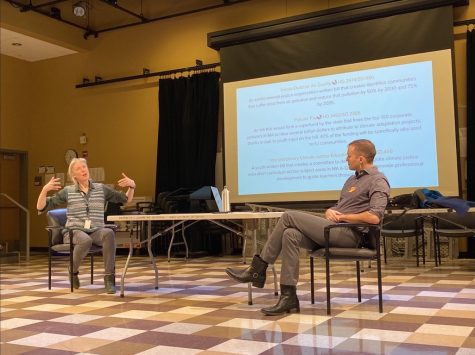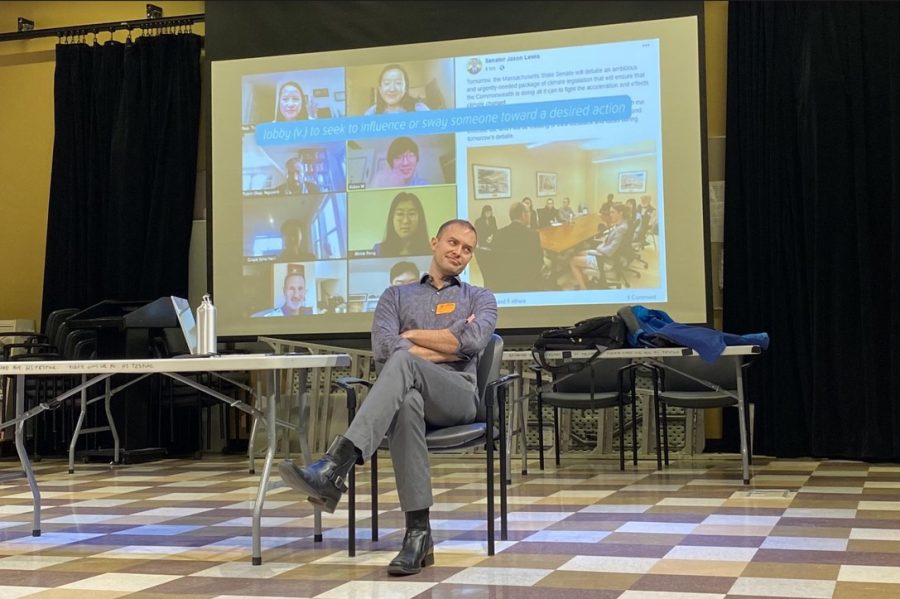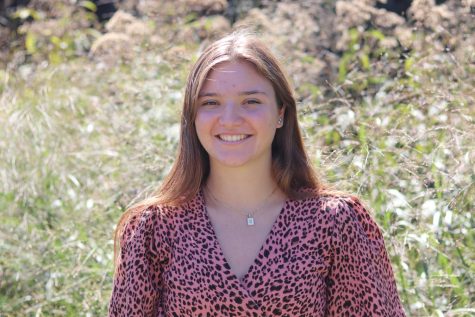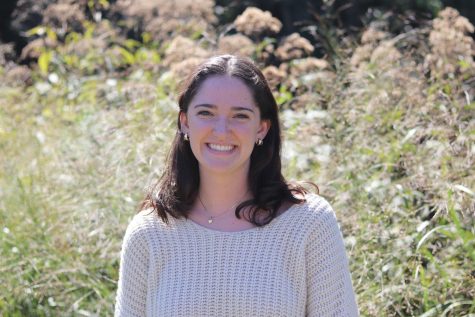Eben Bein: The change we can produce in “Our Climate”
Credit: Sophia Oppenheim
Special guest speaker, Eben Bein sits at the front of the lecture hall sharing his story as a climate change activist. “I don’t think it’s important to talk about climate change,” Bein said. “I think it’s important to talk about climate justice and climate action.”
February 1, 2023
According to climate activist Eben Bein, we all have the power to make a difference in our rapidly changing climate. This power lies in addressing our state government and acknowledging the role young people play in enacting change. English teacher Sara Snow invited Bein to the Winter Week event, “All politics is local: Climate change and you.” The event took place during the first and third blocks on Jan. 30 in the lecture hall.
Snow began the event by telling stories of her past and what led her to her activism about climate change. In addition to being an English teacher, Snow is the advisor of the Green Team at WHS. Green Team is a group of high school students that combat environmental issues within the school, attempting to make the school more green like in their petition against plastic water bottle distribution at WHS earlier this year.
Having a deep love for nature her entire life, Snow has grown more and more upset with the growing mistreatment of the environment in the past 20 years. Because of this, she has attempted to make changes on her own.
“Instead of being all sad and depressed about it, I decided to become an activist,” Snow said. “I was doing the personal stuff, I was protesting, I was acting, I was out marching in those streets. But then I realized we have to change the system. How can we, at a very granular level, change what is essentially an injustice?”
During the event, Snow presented two videos to introduce students to some base level climate change facts. In the shown Brown University video, lecturer Dawn King shared that one American consumes enough carbon equal to five people in most other countries. Snow followed these videos with a short discussion and provided students with additional key contextual information. Afterward, Snow introduced Bein to the floor.
Bein is from Acton, Massachusetts and was formerly a biology teacher at Revere High School. Bein loved his career as a teacher, but after realizing that there was not enough going on in schools to fight climate change, he quit his job to follow his passion in educating and enacting change in the environmental legislature.
“A student said to me, ‘So why aren’t we doing anything about this?’” Bein said. “I just stood there, and in my head I said a lot of bad words, and then I quit.”
Following this realization, Bein joined the organization Our Climate in 2018, where he serves as the Massachusetts Field and Education Manager. He also is the Adult Administrator for the Massachusetts Youth Climate Coalition. In these positions, he works to educate and empower young people to make a difference.
“How can a love for education and a love for doing this work that we’re gathered here to do actually leave the school building and then come back in?” Bein said.
The event consisted of videos and slides showing students what Bein does as an activist. His work with Our Climate gives students the opportunity to talk face to face with legislators to get environmental protection bills passed. He argues that students have a special role in making change, one that many adults cannot reciprocate.
“You don’t need to be a policy expert in order to have a heart and show that heart to a legislator,” Bein said. “Legislators love to hear from young people a lot more than they love to hear from me.”
Senior Serena Field agrees with Bein’s sentiment. In her experience with environmental activism, she has found contacting those holding office to be easy and accessible. Field argues that if a young person approaches officials with something they are passionate about changing, their voice is heard.
“State legislatures and our representatives, especially in Massachusetts, care a lot more than people think that they do,” Field said. “If you just give them a call, send them an email or ask them for a meeting, they actually do consider your opinion.”
A significant portion of Bein’s work is focused on lobbying, which means using persuasion to influence administrators and legislative decisions. While this process may seem intimidating, Bein argues it is very simple at its core. During the Winter Week event, Bein had the students participate in an exercise to simulate the process. To demonstrate this, Bein had the students argue to one another while pretending to convince their parents to give them a new particular privilege.
“I hope that that exercise helps you all realize that you have persuasive powers, you really do,” Bein said. “We need our ideas to stand and for other people to say, ‘Oh wait I can make an argument, and I want to actually. I want a world in which my opinion matters.’”
To further explain what lobbying is in a governmental atmosphere, Bein had Snow play the role of a lobbyist as he played the role of a legislator. This conversation gave students a look into what Bein and those in his organization do.

“I think that when I was your age I thought there were humans like my parents and representatives over there, through a TV, in which they talk at me,” Bein said. “But we all actually are natural born lobbyists.”
Bein invited WHS students to join him in a meeting with legislators on Feb. 7 at the state house. Bein and a group of students part of Our Climate will be going to the state house and lobbying with legislators face to face. They are hoping to pass three bills: Indoor/Outdoor Air Quality, Polluter Pay and Interdisciplinary Climate Justice Education.
“If an individual student is not ready to drop what they are doing next Tuesday and come to the state house in order to talk to their legislator then the next best step is to try to connect the Wayland Green Team with the Massachusetts Youth Climate Coalition,” Bein said.
Bein hopes that his presentation will urge students to make a difference and gain the confidence to approach their local leaders. He believes that students have a lot more power than they typically acknowledge, and should seize the opportunity to exercise their ability.
If you would like to join Bein and Our Climate on their trip to the state house below is a QR code leading an online sign up sheet.






![Last Wednesday, the Wayland School Committee gathered to discuss a number of topics regarding the health curriculum and Innovation Career Pathway course. Another large topic of conversation was the ways to potentially mitigate distracting cell phone usage. "These [phones] are going to distract your learning and social relationships," Superintendent David Fleishman said. "That's concrete right there."](https://waylandstudentpress.com/wp-content/uploads/2025/06/Screenshot-2025-06-04-at-9.49.31 PM-1200x886.png)



























![Troy Hoyt finishes the Boston Marathon, running for the Hoyt Foundation. T. Hoyt is the son of Hoyt Foundation CEO Russ Hoyt.
“[Running a marathon] might seem like a big thing, when it’s presented to you at first, but if you break it up and just keep telling yourself, “Yes, you can,” you can start chipping away at it. And before you know it, you’ll be running the whole 26 miles, and you won’t even think twice about it.” T. Hoyt said.](https://waylandstudentpress.com/wp-content/uploads/2025/04/C36E8761-1CBB-452E-9DF2-543EF7B1095E_1_105_c.jpeg)














































